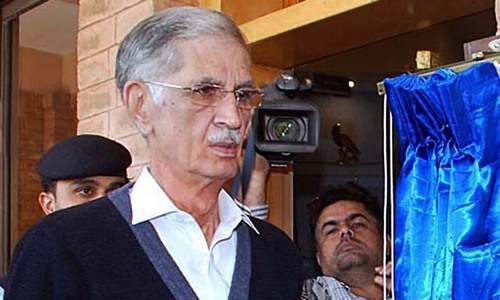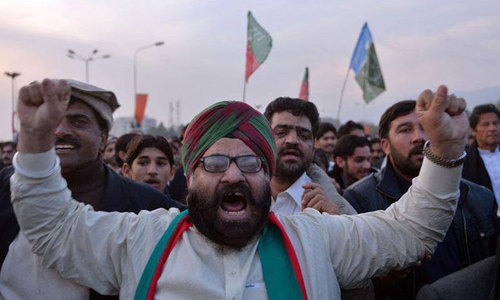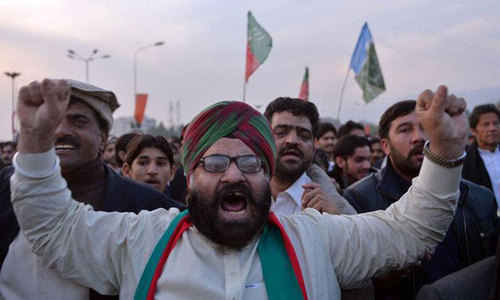The killing of a member of Khyber Pakhtunkhwa Assembly, Sardar Soran Singh, on April 22, 2016 in Buner district has brought to light flaws in the provisions of the Constitution of Pakistan and other relevant laws related to filling of seats reserved for non-Muslims in the National Assembly as well as provincial assemblies in the country.
Soran Singh was elected to the provincial assembly in the 2013 general elections on one of the seats reserved for non-Muslims on the basis of placement of his name at Serial No 1 of a priority list of candidates submitted by his party, the Pakistan Tehreek-i-Insaf, to the Election Commission of Pakistan (ECP).
In a strange twist of events the prime suspect arrested by the police in his murder case is another PTI leader, Baldev Kumar, who was at Serial No 2 of the said priority list of candidates. Under the Constitution, Baldev Kumar, who is also an elected district councillor in his native Swat district, is entitled to become an MPA on the seat which has fallen vacant with the death of Soran Singh.
Chief Minister Pervez Khattak stated in the provincial assembly on April 29 that his government would try to stop the way of Baldev Kumar from becoming an MPA. “We’ll consult our legal experts on how to expel the name of Baldev Kumar from the PTI priority list of the candidates for non-Muslims seats. I will also ask the law secretary to secure a stay order on the issue from the court of law,” he had told the assembly.
Both the treasury and opposition members asked the federal government to amend the relevant law to block the way of Baldev Kumar to the assembly. The officials concerned of the ECP have reportedly stated that under the law they had to declare Mr Kumar as returned candidate on the said seat as presently he was only a suspect and not a convict in the case.
At the time of filing of nomination papers during the 2013 general elections, the then provincial president of PTI Asad Qaiser had submitted the priority list of candidates of his party against the three seats reserved for non-Muslims in the provincial assembly. The priority list included the names of Soran Singh, Baldev Kumar, Ravi Kumar and Wazir Zada.
Keeping in view the number of general seats won by PTI in the provincial assembly it was entitled to a single seat reserved for non-Muslims on which Soran Singh was declared elected.
For filling the seats reserved for women and non-Muslims in a provincial assembly, Article 106 (2) (C) provided that such members shall be elected in accordance with law through proportional representation system of political parties’ lists of candidates on the basis of the total number of general seats secured by each political party in the provincial assembly. The total number of general seats won by a political party shall also include the independent returned candidates who may duly join such a political party within three days of the publication in the official Gazette of the names of returned candidates.
Article 224 (6) of the Constitution provides for filling a reserved seat which falls vacant. It states: “When a seat reserved for women or non-Muslims in the National Assembly or a provincial assembly falls vacant, on account of death, resignation or disqualification of a member, it shall be filled by the next person in order of precedence from the party list of the candidates to be submitted to the Election Commission by the political party whose member has vacated such seat. Provided that if at any time the party list is exhausted, the concerned political party may submit a name for any vacancy which may occur thereafter.”
The seats reserved for women and non-Muslims in the National Assembly and all the four provincial assemblies in its present form were introduced by retired General Pervez Musharraf during his military rule in 2002.
The then military government had made drastic changes in the Constitution through the Legal Framework Order, 2002, which also included introduction of the reserved seats. The then government had also introduced Conduct of General Elections Order, 2002, for the purpose of conducting the 2002 general elections. Article 8 EE of the Conduct of General Elections Order 2002 provided that the parties’ priority lists may contain as many names of additional candidates as a political party may deem necessary for contesting seats reserved for women and non-Muslims to provide for any disqualification of candidates during scrutiny of nomination papers or for filling of any vacant seat during the terms of National Assembly and provincial assemblies, as the case may be.
The said section also provided that a vacant seat shall be filled by the next person in order of precedence from the party’s list of the candidate submitted to the ECP.
Legal experts believe that the present mechanism of filling vacant reserved seats is faulty. They say that once a list is considered during general elections for the purpose of filling reserved seats, the same should not be considered for filling any future vacancy.
“The applicability of a priority list of candidates submitted during general elections should end after that polls and whenever any vacancy occurs the political party concerned shall be asked to submit a fresh name for that particular seat,” said Shahnawaz Khan, an advocate of the Supreme Court.
Under the existing system, no independent candidate could contest for these reserved seats and the candidates are dependent on political parties. Another major point of concern is the indirect mechanism of filling these seats.
Prior to the present mechanism, the seats reserved for non-Muslims in the National Assembly and provincial assemblies were filled through direct polls on the basis of separate electorate. In that mechanism all the non-Muslim voters were entitled to cast vote for electing their representatives against seats reserved for minorities.
A former woman MPA said that through the present mechanism mostly blue-eyed candidates of political parties’ leaders were placed on top of their priority lists. She said that these reserved seats were basically introduced for political mainstreaming of disadvantaged groups in the society, including women and non-Muslims.
Published in Dawn, May 2nd, 2016

















































